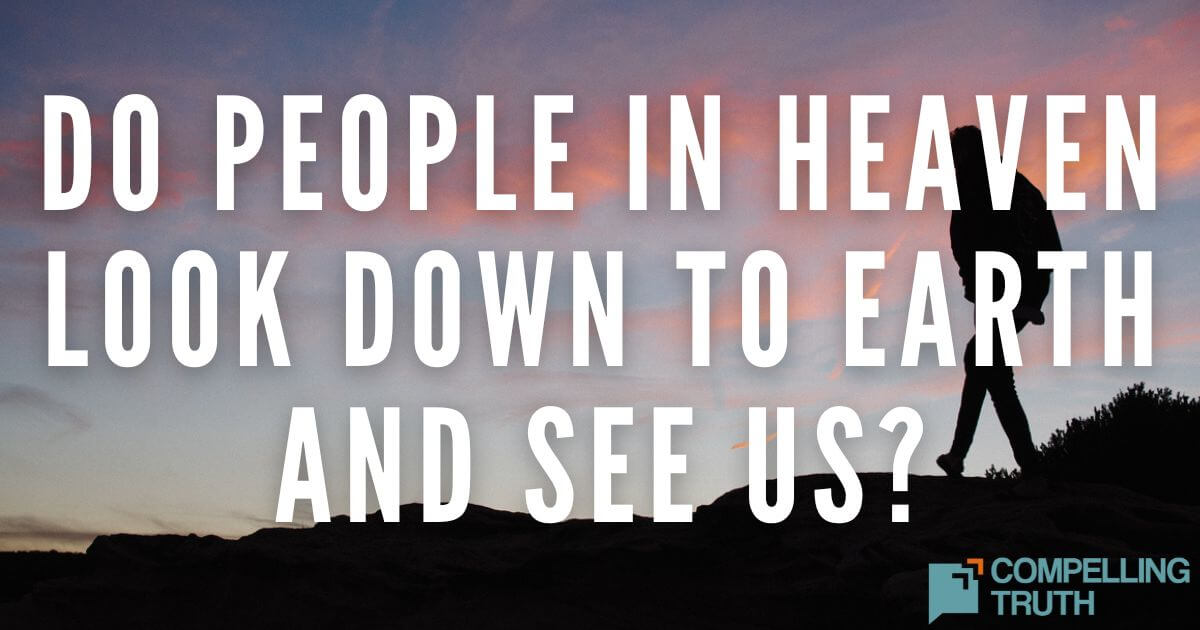When a loved one passes away, it's common for the bereaved to say they feel the presence of the one they've lost. Many even go to grave sites and speak as if the lost one can hear them. Others believe their loved one is watching them, blessing and protecting those they left behind.
These thoughts may bring momentary comfort, but they are not only misguided, they are also dangerous. When people die, they do not become ghosts or angels. For those who follow Christ, their spirits are taken to be in His presence (2 Corinthians 5:6-8; Philippians 1:23). Sadly, those who chose to reject Christ are tormented until final judgment (Luke 16:22-23). There is nothing in the Bible to indicate that the dead have influence over events on earth. In fact, the Bible says that there are no grief, tears, or unhappiness in heaven (Revelation 21:4), which seems to preclude those in heaven from even knowing what is happening on earth.
Instead of holding the dead near, the Bible warns us to have nothing to do with trying to speak with the dead. Deuteronomy 18:10-12 says that God will drive out those who call up the dead. Leviticus 19:31 says that meeting with a medium or spiritist defiles the one who came, and Leviticus 20:27 says the punishment for being a medium or spiritist was death.
There is one account of a medium in the Bible actually communing with the dead. In 1 Samuel 28, beset by the Philistines, King Saul goes to a medium (literally: "mistress of the ghost") to get advice from the late prophet Samuel. When God does allow Samuel to show up, Samuel responds "Why have you disturbed me…?" (vs. 15). Samuel was not pleased about returning his attention to earth. He did not want to leave where he was.
Only God is able to hear our prayers and answer them wisely. He is never out of our reach (Psalm 139:7-12). He is powerful enough to do what we want (Revelation 19:6). But He is also wise enough to know what we need (Psalm 147:4-5).
There are two verses which, taken out of context, seem to suggest praying to the dead. The first is Hebrews 12:1 which starts, "Therefore, since we are surrounded by so great a cloud of witnesses, let us also lay aside every weight …" This verse directly follows a list of Old Testament people who are noted for their faithfulness to God. The "cloud of witnesses" surrounding us means Old Testament saints. But it does not mean those saints are literally surrounding us. Instead, their legacy and example permeates the church, giving us encouragement to live as we should.
The second verse is used to justify praying to saints. James 5:16b says, "The prayer of a righteous person has great power as it is working." Some take this to mean we should ask the righteous in heaven to pray for us. But the verse comes on the heel of several admonitions for the letter's audience to pray for healing and repentance. There is no mention of praying to the dead or asking the dead to pray for us.
Praying to the dead is unbiblical. The Bible condemns it as both useless and dangerous. Very often, personal issues are left unresolved when a loved one dies. Those left behind may wish to speak the words they needed to say beforehand, in hopes that the dead can hear. But the dead cannot hear. Instead, speak to the only One Who can bring closure to our own hearts. Tell God how you feel, what you think about the other person, and whatever regrets you may have. Jesus is the only mediator we need; because of His sacrifice "Let us then with confidence draw near to the throne of grace, that we may receive mercy and find grace to help in time of need" (Hebrews 4:16). The power of Christ in us brings healing, not the involvement of the dead.
These thoughts may bring momentary comfort, but they are not only misguided, they are also dangerous. When people die, they do not become ghosts or angels. For those who follow Christ, their spirits are taken to be in His presence (2 Corinthians 5:6-8; Philippians 1:23). Sadly, those who chose to reject Christ are tormented until final judgment (Luke 16:22-23). There is nothing in the Bible to indicate that the dead have influence over events on earth. In fact, the Bible says that there are no grief, tears, or unhappiness in heaven (Revelation 21:4), which seems to preclude those in heaven from even knowing what is happening on earth.
Instead of holding the dead near, the Bible warns us to have nothing to do with trying to speak with the dead. Deuteronomy 18:10-12 says that God will drive out those who call up the dead. Leviticus 19:31 says that meeting with a medium or spiritist defiles the one who came, and Leviticus 20:27 says the punishment for being a medium or spiritist was death.
There is one account of a medium in the Bible actually communing with the dead. In 1 Samuel 28, beset by the Philistines, King Saul goes to a medium (literally: "mistress of the ghost") to get advice from the late prophet Samuel. When God does allow Samuel to show up, Samuel responds "Why have you disturbed me…?" (vs. 15). Samuel was not pleased about returning his attention to earth. He did not want to leave where he was.
Only God is able to hear our prayers and answer them wisely. He is never out of our reach (Psalm 139:7-12). He is powerful enough to do what we want (Revelation 19:6). But He is also wise enough to know what we need (Psalm 147:4-5).
There are two verses which, taken out of context, seem to suggest praying to the dead. The first is Hebrews 12:1 which starts, "Therefore, since we are surrounded by so great a cloud of witnesses, let us also lay aside every weight …" This verse directly follows a list of Old Testament people who are noted for their faithfulness to God. The "cloud of witnesses" surrounding us means Old Testament saints. But it does not mean those saints are literally surrounding us. Instead, their legacy and example permeates the church, giving us encouragement to live as we should.
The second verse is used to justify praying to saints. James 5:16b says, "The prayer of a righteous person has great power as it is working." Some take this to mean we should ask the righteous in heaven to pray for us. But the verse comes on the heel of several admonitions for the letter's audience to pray for healing and repentance. There is no mention of praying to the dead or asking the dead to pray for us.
Praying to the dead is unbiblical. The Bible condemns it as both useless and dangerous. Very often, personal issues are left unresolved when a loved one dies. Those left behind may wish to speak the words they needed to say beforehand, in hopes that the dead can hear. But the dead cannot hear. Instead, speak to the only One Who can bring closure to our own hearts. Tell God how you feel, what you think about the other person, and whatever regrets you may have. Jesus is the only mediator we need; because of His sacrifice "Let us then with confidence draw near to the throne of grace, that we may receive mercy and find grace to help in time of need" (Hebrews 4:16). The power of Christ in us brings healing, not the involvement of the dead.



